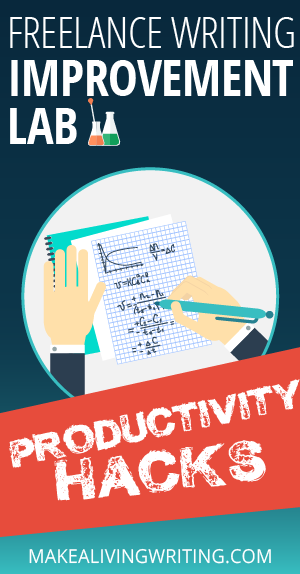
This is especially true if you’re looking to get into content marketing, where you might develop a dozen blog posts or other pieces of content a month for each of multiple different clients. I speak as someone who at one point was writing 72 posts a month, between client blogs and my own blog.
Your success in blogging for clients is highly dependent on your speed. If you’re slow, you won’t be able to juggle multiple content marketing clients and book enough revenue — and you may even be in trouble in terms of meeting your deadlines.
Fortunately, learning to get the writing done faster has been a longtime hobby of mine. My drive to speed up was forged during 12 years as a staff writer, the last five of which required filing a story for our online edition, five days a week by 10 am (in addition to the 3-4 articles a week we had to write).
How did I learn to cut my writing time down? Here are my seven top tips:
1. Stop over-researching
Do you drum up a book’s worth of research for every 750-word article you write? I feel ya — I was super-guilty of this when I first started out. But this turns the writing process into a time-sucking nightmare, as you have way too much material to juggle and have to make painful decisions to leave out interesting stuff.
If you want to earn real money in writing, you’ve got to cut this out. Look at your past pieces and figure out how many research stats or citations fit into a story of that length. When you’ve got that many, stop. If you have interesting side points, save them for another article!
The other way to cut research time is to stop randomly Googling around (and around and around) for information, and learn to be a more effective researcher.
Instead of open Google searches, try Google Scholar to find academic research papers, or the Google News tab for press releases, or Blog Search Engine to find related blog posts. Better yet, hit your local research librarian and ask them about databases they subscribe to that might help you cut to the chase.
2. Stop recording interviews
Recorded interviews require transcribing. This either kills a bunch of your time or costs you money. Either way, you’ve then got to read through the transcript.
Improving your typing speed and learning to take shorthand are both extremely valuable time-saving tools for the busy freelance writer. I learned to do both, and haven’t recorded an interview in years. The result is untold hours of time saved in creating each blog post and article that involves interviews.
The only time it really pays to record is if you’re interviewing a celebrity who’d be impossible to circle back with if you have unclear notes or additional questions.
3. Stop over-interviewing
Do you do 10 interviews for a 500-word article, or interview each source for an hour and a half? That’s not all going to fit into the story.
Don’t abuse your experts’ time or waste time yourself, and limit most interviews to 20-30 minutes tops. The only time you should really need to take much more of an interview subject’s time is if it’s a profile of them.
4. Stop writing overlong first drafts
Do you write a first draft that’s two or even three times the length of your intended wordcount? This is an epic way to create a ton of extra work for yourself. (I still remember the agony of cutting down the 6,000-word first draft of my first 3,000-word cover feature for a newspaper. Ugh!)
One big way to get faster is to discipline yourself to write to length. The easy way to do this is to write subheads for your blog post or story first. Then, take the total length and divide it up by the number of subheads.
For instance, if you have a 1,000-word article with 4 subheads, each section is going to average 250 words. As you write each section, be aware of the space limit for that section. Strive to write short, so that you need little time for editing it down. It’s easier to go back to your notes and find one more interesting point to pop in than it is to find dozens of paragraphs to cut that you worked hard to write.
5. Stop editing as you go and over-editing
We all know that it bogs down the creative writing process if you stop after you write each sentence or paragraph and start fiddling with the editing.
If at all possible, try to spit out a first draft without engaging the editing side of your brain. Don’t stop to look up quotes or research either, or trivia like name spellings. If need be, leave blanks or notes to yourself on facts you need to look up and plug in later. Just spit it out. Doing your editing in a single swoop after your draft is complete will save a block of time.
Next, challenge yourself to edit just once. Maybe read it through once again the next day, and then send it out. Don’t keep picking at it — it’s just wasted time. Remember, your editor is probably going to edit it again, too!
6. Shorten your available time
Do you have 3 weeks to write an assigned article? Give yourself 2.5. If an assignment is due at the end of the day, challenge yourself to get it done by noon.
It may seem counter-intuitive, but nothing concentrates the mind like a truly pressing deadline. It’ll also help you with many of the points above — over-researching and reporting, and writing overlong will all be curtailed if you simply don’t have the time left for it.
Bonus payoff: Aiming early gives you wiggle room if things really go wrong, and you’re more likely to still make your deadline.
7. Organize your time more efficiently
There are a few ways you can gain more productive freelance writing time. One I love is to stop jumping from project to project all day, and to block out a whole day or half-day for a single project. Clear the decks, and your mind will naturally focus better on getting the writing done.
If you have four blog posts to do this month for a client, sit down and write them all back-to-back. Staying in your client’s voice, instead of hopping in and out of it on different days, will save you a bunch of time.
Finally, if you can, do your freelance writing at the time of day where you know you’re most naturally creative. Whether you’re an early riser or a night owl, if you can leave marketing tasks and other miscellany for other times and use more of your prime writing time for writing, you’ll naturally get more done with greater ease.
Keep raising the freelance writing speed bar
Not all of these tips may be relevant to your situation, but hopefully there’s something here that could help you get faster.
My final tip? Simply have a goal of continually speeding up your writing process. Track your hours, and keep challenging yourself to get assignments written faster. It’ll pay off in more well-developed writing chops, the ability to take more rush work at prime rates, and ultimately, in higher income.
How have you improved your writing process? Leave a comment and share your tip.










